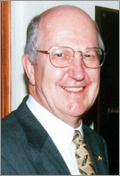201st ECS Meeting | Philadelphia, PA | May 13, 2002

Chemistry Is Electric

Chemistry Is Electric
Monday morning saw the official opening of the meeting, with the first of three plenary talks, this one sponsored by Wilson Greatbatch, Ltd. Arnold Thackray, president of the Chemical Heritage Foundation, presented his lecture to a packed audience. Entitled “Chemistry is Electric: A Cavalcade of History from Benjamin Franklin and Alessandro Volta to Gordon Moore and Beyond,” his talk was a nostalgic trip through the history of electrochemical science and technology. Dr. Thackray reminded the audience that May 13 marked the 250th anniversary (to the day) of the first scientific demonstration (in 1752, before the Paris Academy of Science) verifying Ben Franklin’s theory of electricity. We were told of how, inspired by Franklin, Joseph Priestley chose a career in science; he was then followed by a gallery of giants including Galvani, Volta, Davy, and Faraday. Volta (of the “voltaic” pile fame) disproved Galvani’s theory of “animal electricity” and in 1801 he was also the first to claim someone no less than Napoleon Bonaparte as a demonstration assistant! After a golden period in British science — Davy discovered batteries and Michael Faraday demonstrated the electric motor in 1821 and the dynamo in 1831 — the field of modern electrochemistry was truly born with Grove’s description of a “gas battery” in 1862, which subsequently morphed into the fuel cell as we know it today.
Thackray described how the field of electrochemistry might have gotten a further fillip in the UK by the now popular practice of silver electroplating. Apparently this electroplating art was becoming quite fashionable in social circles because of the popularity and prestige associated with silverware. Obviously gold electroplating had not seen the light of day yet. There was a hiatus in electrochemical developments until 1855 when Charles Hall pioneered aluminum production leading to the founding of ALCOA (Aluminum Company of America). This development was followed by Herbert Dow’s electrolysis work in 1890, which subsequently led to formation of the Dow Chemical Company in 1897. (Ed. Note: A fuller account of this fertile period in the U.S. chemical/electrochemical history may be found in the spring issue of Interface; Vol. 11, No. 1, p. 22, and in the new ECS history book written by F. A. Trumbore and D. R. Turner).
The latter part of Thackray’s lecture covered the period just prior to, and following, World War II. The invention of the TV set and the HgO battery based “handietalkie” were mentioned as notable examples during this period, as was the ENIAC, the first electronic computer.
All in all, this lecture was very informative and entertaining. It set the right historical tone to an eventful meeting week that would culminate in a “Roast of ECS” at the Centennial Party, giving another fascinating peek back into history, but with a focus on the role that ECS and its constituent personalities played in molding it.
